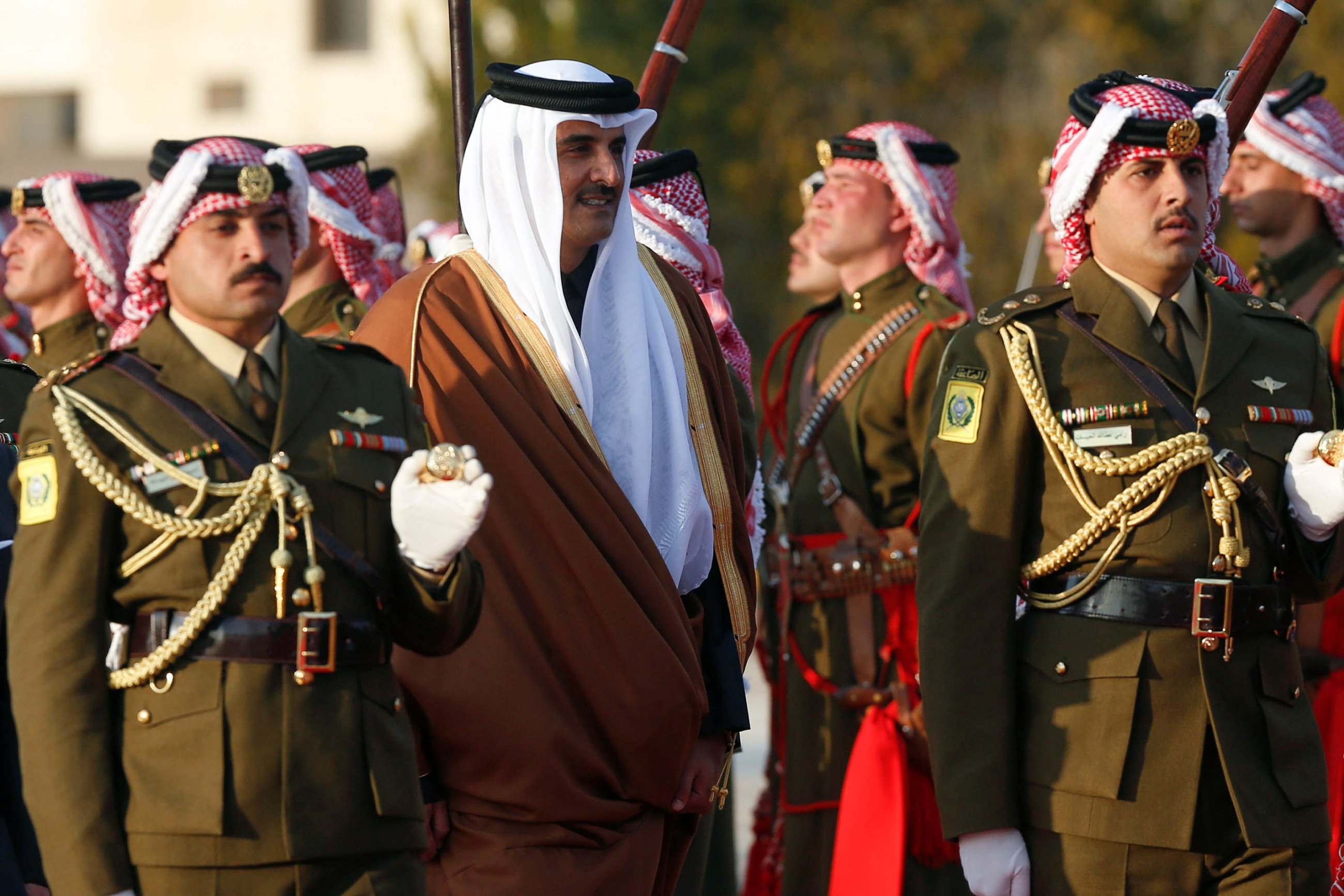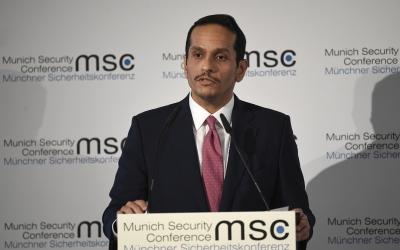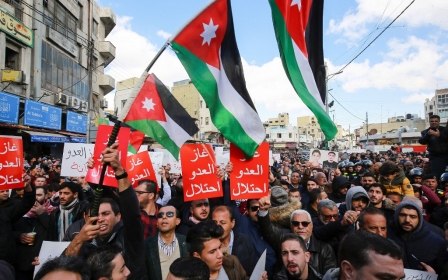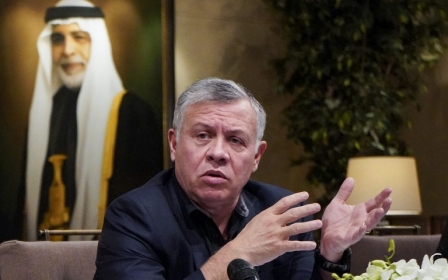Qatar emir pledges 10,000 new jobs for Jordanians

Qatar's Emir Sheikh Tamim bin Hamad al-Thani has pledged 10,000 new jobs for Jordanians, during a visit to Amman, months after the two states restored full diplomatic relations.
Al-Thani, who was accompanied by members of Qatar’s Sovereign Wealth Fund, also offered a $30m grant for Jordan’s military retirement fund.
The announcement comes as Amman continues to strike a balance between its domestic and regional interests, walking a careful line between competing Gulf patrons, analysts say.
'Qatar is a country that wants to help Jordan with its economic woes through an increase in investments and employing Jordanians in Doha which would relieve the pressure on Jordan's markets'
- Munther Hewarat, Jordanian political commentator
Chief among Jordan's domestic concerns are its financial woes. which have sparked protests and brought about the resignation of the prime minister in 2018.
The kingdom, which has a 19.2 percent unemployment rate, debt of around $42bn and is hosting over a million Syrian refugees, lacks natural resources and is reliant on foreign aid, much of it coming from Saudi Arabia, the UAE and Qatar.
New MEE newsletter: Jerusalem Dispatch
Sign up to get the latest insights and analysis on Israel-Palestine, alongside Turkey Unpacked and other MEE newsletters
That reliance, however, has been complicated by regional tensions, starting with the siege of Qatar in June 2017 which saw Jordan side with the four Arab states – Saudi Arabia, Bahrain, the UAE and Egypt – that imposed the economic and political boycott on Doha after having accused it of supporting terrorism.
Days after the blockade was set in place, Amman downgraded its diplomatic representation to Qatar, but restored full ties last July.
Opening up Qatari markets
According to analysts, the Trump administration's unveiling of its Israeli-Palestinian peace plan has pushed the kingdom to look for alternative funding sources to Saudi Arabia and the UAE, which have maintained close ties with the US as the deal came to fruition.
The announcement of the deal sparked protests in the kingdom, which hosts more than 2 million Palestinian refugees and holds the custodianship of Muslim holy sites in Jerusalem.
Munther Hewarat, a Jordanian writer and political commentator, told Middle East Eye that the kingdom should "work on diversifying its sources of support, especially considering the fact that Arab Gulf countries have generally reduced their direct support and have transferred some of it to projects rather than cash subsidies to the coffers of the Jordanian government".
But Hewarat said that Jordan's economic concerns pale in comparison to its need for "massive Arab and international support" in the face of the Trump peace plan, which aims to "liquidate the Palestinian cause".
"Qatar is a country that wants to help Jordan with its economic woes through an increase in investments and employing Jordanians in Doha which would relieve the pressure on Jordan's markets," he said. "The visit also aims at opening up the Qatari markets to Jordanian exports."
Hewarat added that he believes Jordan might play a role as mediator in the Qatari-Gulf reconciliation because of its good relations with all sides.
Moving towards reconciliation?
Jawwad Anani, former head of the Jordanian Royal Court and former deputy prime minister, said he also sees an opening for Jordan to help bring regional tensions to an end.
"The summit between Sheikh Tamim and King Abdullah II will cause sensitivity to some countries but we see that there is a chance for reconciliation led, for example, by Kuwait," he said.
"Saudi says that the negotiations are moving towards reconciliation and here is a chance for Jordan to play a role in this rapprochement."
The new jobs announced by the Qatari emir this week come in addition to 10,000 separate jobs he offered the kingdom back in 2018, and reflect an understanding from Doha of the diplomatic complexities that Jordan has faced, Anani added.
"Qatar understands the circumstance of Jordan when Saudi Arabia and others initiated the boycott of Qatar and Jordan lowered the Qatari representation and closed the Al Jazeera offices at the time," he said.
"Qatar didn’t reciprocate and instead it invested in Jordan with $1.5bn and offered 10,000 job opportunities for Jordanians to work in their country."
'Deal of the Century' on the table
Ahead of the two-day visit, a source close to the Jordanian Royal Court told MEE that several topics were scheduled to be discussed between the emir and the king, including the so-called 'Deal of the Century' and the wars in Yemen and Syria.
The same source said that Qatar investment, which currently stands at $1.b5n, is expected to rise and that is why officials from the sovereign wealth fund were part of the delegation.
Doha, he added, is due to sign an agreement that will include a role for Jordanian security officials in the upcoming 2022 World Cup games to be held in Qatar.
'Qatar wants to say by means of its visit that it is able to move around on the Arab front and that it has overtaken the Gulf siege'
- Sabri Rbeihat, Jordan's former political development minister
In an interview on Sunday with Al Jazeera, Amjad Adaileh, Jordanian minister of media affairs and government spokesman, said that relations between Jordan and Qatar have returned to normal.
"We look forward to advancing the economic ties so as to provide for investment in Jordan and for providing work opportunity for Jordanians to work in Qatar," he said.
According to a statement from the Jordanian Royal Court following their meeting, the two leaders agreed that Arabs must support Palestinians to attain their just and legitimate rights and to establish a viable Palestinian state on the 1967 borders with East Jerusalem as its capital.
The basis of that agreement, they decided, must be the two-state solution and international law.
Benefit for both countries
Sabri Rbeihat, the kingdom’s former political development minister, told MEE that the visit is as important for Qatar as it is for Jordan.
"Qatar wants to say by means of its visit that it is able to move around on the Arab front and that it has overtaken the Gulf siege," he said.
But there are also Jordanians weary of the continuing dependence on Arab and foreign financial support and would rather see the kingdom respond to its economic pressures by becoming more self-sufficient.
Marwan Muasher, the former Jordanian foreign minister, told MEE: "We need to strengthen the internal front by creating an economy that can be independent.
"The phase of depending totally on outside support has finished, and the time has come to build a strong economy."
Middle East Eye delivers independent and unrivalled coverage and analysis of the Middle East, North Africa and beyond. To learn more about republishing this content and the associated fees, please fill out this form. More about MEE can be found here.





